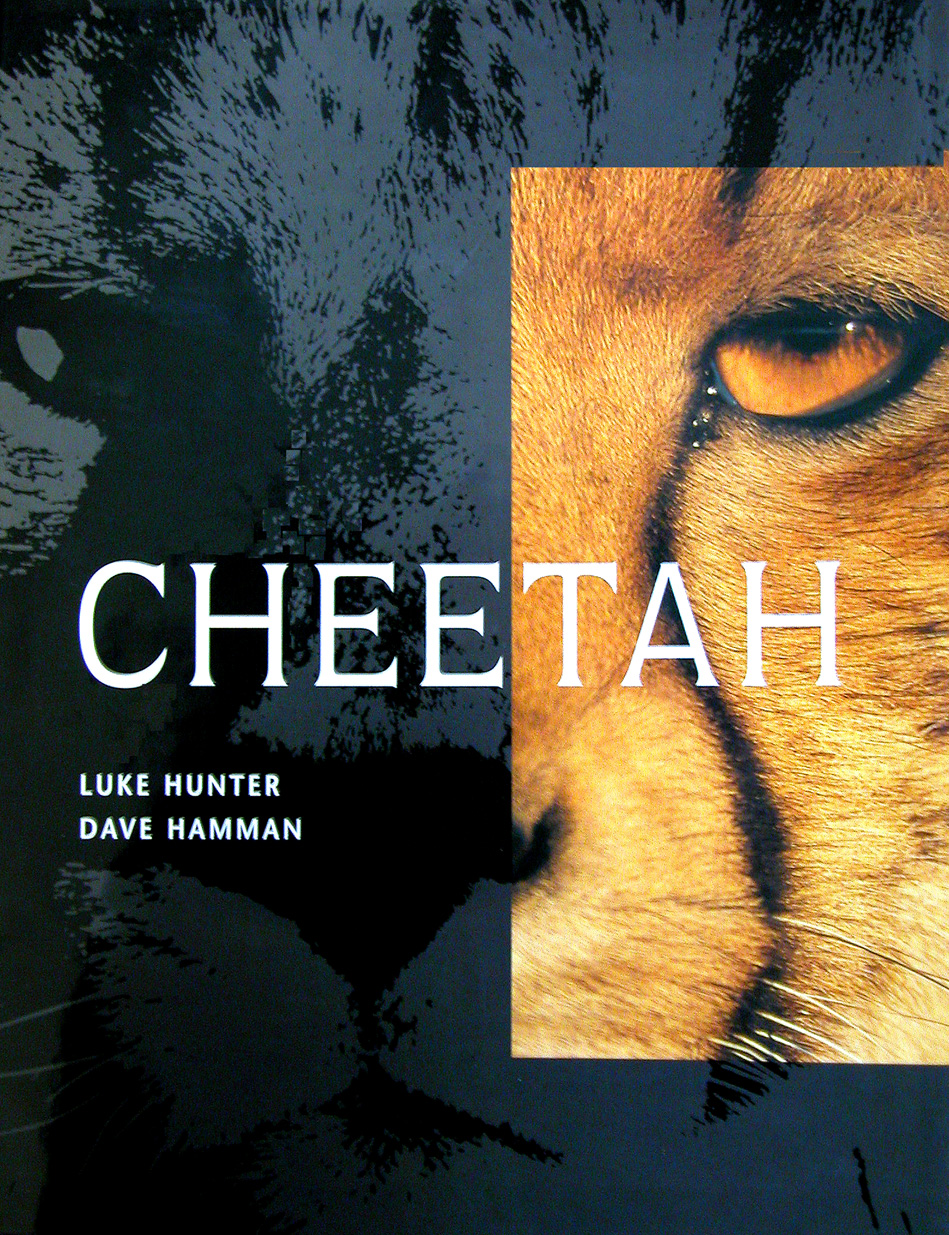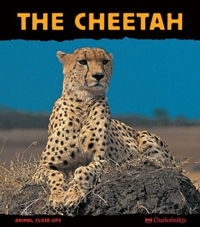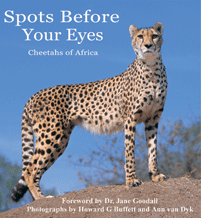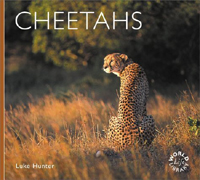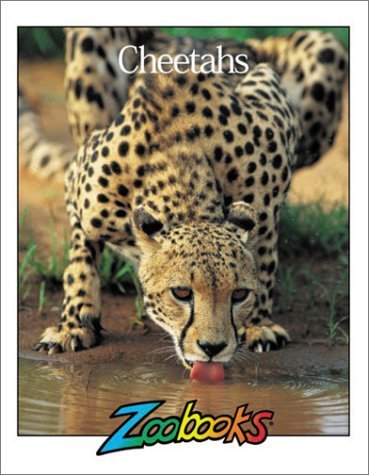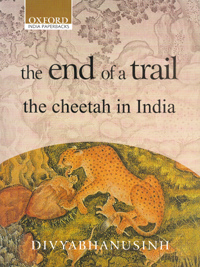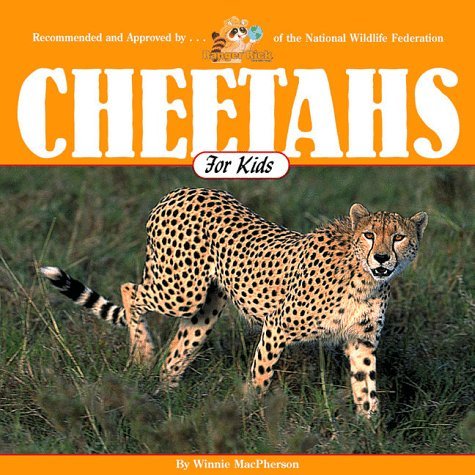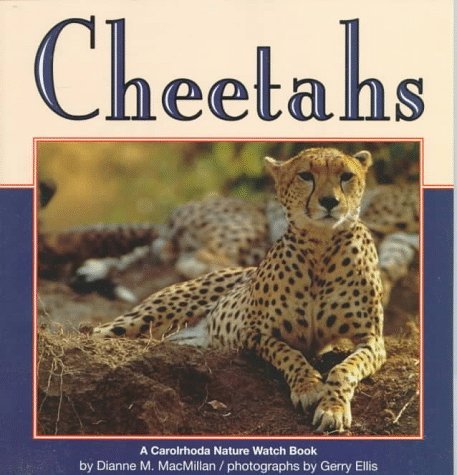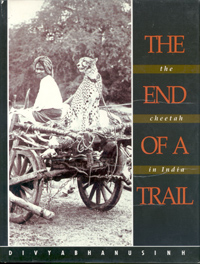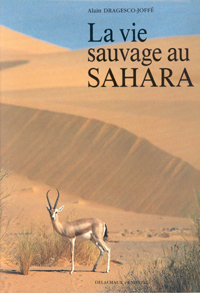|
|
Hunter L., Hamman D. 2006. Cheetah
This large-format book depicts the history, evolution,
behaviour and day-to-day survival of one of the most fascinating cats of the
African continent. It discusses the evolution of the cheetah, its lifestyle,
mating, rearing of cubs, family grouping, and its distribution in Africa.
Book_review_2007_by_Kristin_Nowell_Cat_News_46
Struik Publishers ISBN: 186872719X 144 pp |
|
|
|
|
|
O'Brien S.J. 2004. The Tears of the Cheetah - and other Tales from the Genetic Frontier
O'Brien compellingly describes his team's pursuit of genetic "paw prints" that might reveal why certain creatures succumb to ailments, while others flourish. In 14 chapters, O'Brien traces the genetic history of cheetahs, pandas, humpback whales, and other mammals to reveal adaptations that have enabled the species to escape extinction. He reports on how these data are helping scientists both preserve these wild animals and find valuable clues to fighting diseases that afflict people. O'Brien's text is largely free of jargon and full of entertaining and enlightening anecdotes from the field and the lab.
Book review_2004_by_Peter_Jackson_CatNews_40
St. Martins Press ISBN-10: 0312272863 304 pp |
|
|
|
|
|
Denis-Huot Ch., Denis-Huot M. 2004. The Cheetah
The "Animal Close-up" series gives readers a good look at the cheetah family. It details their running ability, courtship, mating, and child rearing habits. The only member of the feline family without retractable claws, the cheetah can run at speeds of 70 miles per hour for short bursts. They are agile, graceful, and absolutely stunning with their glorious spots. Cheetahs have enemies and must be very careful of larger animals that might steal the meal they have just killed or kill their offspring. Some wildlife areas set aside to protect cheetahs must also be off limits to humans who might killing these cats if they attack domestic livestock. Books such as this with beautiful photographs will, hopefully, bring a better understanding of these beautiful creatures, including their cousins are also described.
Charlesbridge Publishing, 28 pp ISBN: 1570916268 |
|
|
|
|
|
Buffet
H. and va Dyk A. 2003. Spots Before Your Eyes - Cheetahs
of Africa
Spots Before Your Eyes presents the history and facts about the cheetah species in 186 pages of text with 225 color photographs. It features a foreword by Dr. Jane Goodall.
The Howard Buffet Foundation, Biolmages IL, 186 pp ISBN 0-9707385-6-0 |
|
|
|
|
|
Hunter L. 2000. Cheetahs
There is no predator on earth quite like the cheetah. Timed at over 60 miles per hour, it boasts natural speed unsurpassed on land. "Cheetahs" looks in detail at the natural history of the cheetah, including its distribution, social structure, feeding habits, and its relationship with humans. Cheetahs is an easy-to-read introduction to this magnificent animal, illustrated with spectacular color photographs, taken from all over the world by award-winning photographers.
Book_review_2000_by_Peter_Jackson_CatNews_33 Voyager Press, 72 pp ISBN 0896585018 |
|
|
|
|
|
Wood L.C., Jenson C.L., 2000. Cheetahs
We all know cheetahs can keep up with traffic on the freeway, but is everyone aware that from a standing start, a cheetah can accelerate faster than a racecar? Watch out-kids may be so intrigued they'll want to get out a stopwatch and see how fast they can accelerate. Zoobooks, the 59-book animal series - the "everything you wanted to know but didn't know who to ask" guide to the world's most fascinating creatures. Each exciting edition of Zoobooks is packed with current scientific facts, striking photography, beautiful illustrations and unique activities that teach children about animals and the habitats in which they live. With innovative publications and products, Wildlife Education, Ltd. has enriched the lives of children, parents, and educators nationwide for 20 years. All titles are offered in library-bound hardcover and soft-cover styles. Zoobooks, ideal for the knowledge-hungry 4-11 year old!
Wildlife Education, Ltd. ISBN: 0937934674 18 pp |
|
|
|
|
|
Divyabhanusinh 1999. The End of a Trail - The Cheetah in India (pbk)
This is a study of the cheetah, now extinct in India, through the ages of Indian history. The product of a decade of extensive research, this is the only work which traces the history and ecology of an animal species from the pre-historic period to recent times. Using a range of sources, from prehistoric cave paintings to oral testimony, it provides a comprehensive account of the animal's interaction with man through the ages, charting its path to extinction and exploring the possibility of its reintroduction in India.
Oxford University Press, India Paperbacks ISBN 019565891-4 268 pp |
|
|
|
|
|
MacPherson W. 1998. Cheetahs for Kids
Beth is a lucky 11-year-old who travels to Africa with her parents to see this fascinating member of the cat family. She learns what their name means, why they have a white tip on their tail, and how cubs are raised. Plus a whole lot more. Recommended and approved by the National Wildlife Federation. Reading level: Ages 4-8
Northword Press ISBN: 1559716657 47 pp |
|
|
|
|
|
Thompson S.E. 1998. Built for speed.
The cheetah is the world fastest land animal, running at speeds up to 70 miles per hour. The cat is perfectly adapted to high-speed hunting, but is threatened by predators, desease and its own biology, and people have hunted it for its fur and to protect livestock. As a result the cheetah is consicered an endangered species. In this informative book, Sheron Elaine Thompson describes the cheetah's unique way of live, the physical adaptions that make it so fast, the danger it faces and the measures people are taking to keep the speed damon cat of the plains from becoming extinct.
Lerner Publications ISBN: 0822528541 88 pp |
|
|
|
|
|
MacMillan D.M., Ellis G. 1997. Cheetahs
This informative and attractively illustrated book discusses the cheetah's physical characteristics, habitat, ways of hunting, family life, and endangerment as well as the efforts of conservationists to help the species survive. The book includes many clear full-color photographs of cheetahs in the wild, photos that are well placed and well captioned to enlarge readers' understanding of the ideas in the text. A range map and glossary round out the presentation. Sure to please cheetah enthusiasts as well as students researching animal reports, this attractive volume from the Nature Watch series will satisfy many readers.
Carolrhoda Books ISBN-10: 1575050447 48 pp |
|
|
|
|
|
Divyabhanusinh 1995. The End of a Trail - The Cheetah in India (hbk)
This work traces the cheetah from prehistoric times through history, to its ulitmate extinction on the Indian subcontinent in the 20th century. The author has painstakingly searched for the cheetah in Indus seals, coins of Indian kings and dynasties, Classical Greek and Latin, Sanskrit, Persion, Urdu, Marathi and Hindi literature and lexicons, Indian paintings and photographs over a period of a decade to produce a history of the animal through the ages.
Book_review_1996_by_Peter_Jackson_CatNews_24
Banyan Books, New Delhi ISBN 81-86558-05-5 248 pp |
|
|
|
|
|
Caro T. M. 1994. Cheetahs of the Serengeti Plains - Group Living in a Social Species
Cheetahs of the Serengeti Plains is on of the most comprehensive accounts of carnivore social behavior. Synthesizing more than a decade of research in the wild, this book offers a detailed account of the behavior and ecology of cheetahs. Compared with other mammals, cheethas have an unusual breeding system; wheras lions live in prides and tigers are solitary, some cheetahs live in groups while others live by themselves. The authors explores group and solitary living among cheetahs and discovers that the causes of social behavior vary dramatically, even within a single species.
Book_review_1994_by_Peter_Jackson_CatNews_21
The University of Chicago Press ISBN 0-226-09434-0 478 pp. |
|
|
|
|
|
Dragesco-Joffé A. 1993. La vie sauvage au Sahara
«La Vie sauvage au Sahara» constitue un vaste panorama sur la faune du plus beau et du plus grand désert du monde dont il s'attache à montrer l'étonnante diversité. Les grandes espèces spectaculaires, presque toutes menacées de disparition et très mal connues du fait de leur extrême rareté, ont été volontairement privilégiées: Addax, Oryx algazelle, Gazelles damas et dorcas, Guépard saharien, Chat des sables, pour n'en citer que quelques-uns. Le texte constitue la synthèse de plus de 7 000 observations tirées des carnets de terrain que l'auteur a remplis méthodiquement au cours de ses 9 expéditions et 31 mois passés à rechercher la faune saharienne entre 1977 et 1990. Une place importante est laissée aux témoignages recueillis auprès des guides et chasseurs nomades, afin de mieux comprendre ce que représente la faune pour les autochtones de ces régions et quelles sont les mesures de protection les plus efficaces à prendre.
Book_review_1993_by_Peter_Jackson_CatNews_19 (English)
Delachaux & Niestle ISBN: 2603008714 240 pp |
|
|
|
|
|
|
